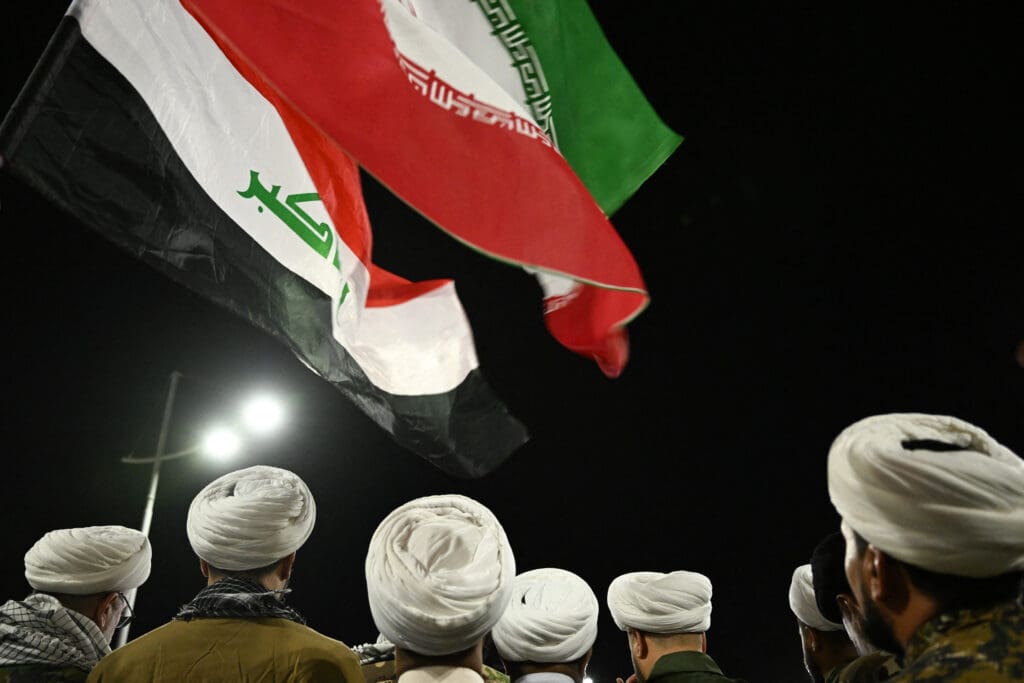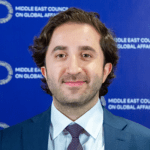When Israel and the United States launched a bombing campaign against Tehran’s nuclear program in June, Iran-aligned forces that have spent years building their influence and arsenals in neighboring Iraq were oddly silent. Yet despite their decision to stay out of the so-called “12-day war,” pro-Iranian groups still have far-reaching influence in Baghdad, while co-existing with U.S. forces and bases.
These competing pressures have long obliged Iraqi leaders to navigate a delicate balancing act. The country, often seen as the lungs through which Iran breathes, constitutes a strategic zone of influence and a key node in a region-wide Iranian network of proxies and allies—a network whose other members have been severely degraded since October 7, 2023. Yet Iran’s conflict with Israel is far from resolved—indeed, it has entered an unprecedented and dangerous phase, potentially placing Iraq in the eye of a regional storm.
At the heart of the current crisis is Iraq’s complicated and multi-layered relationship with Iran. Iraq hosts a range of Iranian-backed militias under the banner of the Popular Mobilization Forces (PMF), some of which have been implicated in attacks on U.S. military bases and on Israel. These militias serve as key parts of Iran’s regional network, and in the past Tehran has mobilized them to target Western interests and Israel. At the same time, the U.S. continues to maintain a military footprint in Iraq, making the country a potential flashpoint in the event the militias were to harm U.S. personnel.
The PMF functions as an extension of the Islamic Republic in Iraq, a military and ideological conduit that allows Tehran to exert military pressure on its rivals in both Iraq and the region, in addition to using Iraq’s institutions to circumvent U.S. sanctions. The groups that comprise the PMF, while technically state-sanctioned, operate outside of the Iraqi armed forces’ chain of command, answering directly to Tehran. What is more, they have a documented history of attacking U.S. personnel.
Since October 7, 2023, the Iranian regime’s domestic and regional standing has taken a dramatic hit as allies such as Syria’s Assad regime fell to opposition groups and Lebanon’s Hezbollah became severely degraded. Although Iraq’s PMF likely feel both an emotional and strategic pull to join any confrontation that pits Iran against Israel and the U.S., the organization’s relatively muted response to the recent escalation, particularly that of its most battle-hardened, Iran-aligned ideologues, indicates that these groups do not want to test Israel’s current military momentum—or expose their own limitations.
Indeed, such a move could be catastrophic for Iraq. The Trump administration has the PMF in its cross-hairs, and like the Biden administration, is not averse to striking these militias—it has done so on several occasions, particularly along the border with Syria. Similarly, while Israel has not executed a comprehensive campaign within Iraq, it has in the past struck targets within Iraqi territory. In the event of another conflagration, PMF involvement may trigger a wider response from the U.S. and Israel, while also extending Trump’s renewed policy of “maximum pressure” on Iran deep into Iraq.
The Trump administration has shown little tolerance for Iranian influence in Iraq, as evidenced by its decision to end Baghdad’s waiver to import Iranian electricity, forcing Iraq into a painful and ill-prepared energy transition. The administration has accused the state-owned Rafidain Bank of processing payments for Yemen’s Houthis, which is designated as a terrorist group by the United States, and has also placed sanctions on several Iraqi banks that are complicit in allowing Iran to circumvent U.S. sanctions. In response, it has threatened to sanction the Iraqi state as a whole, which would have devastating consequences for Iraq and exisential implications for the state.
A PMF Comeback?
This pressure also has political ramifications, especially for Iraqi Prime Minister Mohammed Shia al-Sudani, who faces the challenge of managing deteriorating relations with the U.S., while fending off domestic rivals and appeasing powerful Iran-aligned blocs. In this precarious position, Sudani would struggle to avoid responsibility were the PMF to undermine U.S. interests or target U.S. personnel.
Indeed, Sudani has been accused of either enabling the ascension of Iran-aligned groups or turning a blind eye to their widening grip on Iraq and its institutions since he came to office. According to recent reports, smuggling networks—especially those operating under the PMF’s protection—have flourished since Sudani took office. It has also not escaped Washington’s attention that, under pressure from Iran, Sudani has penalized the Kurdistan Regional Government (KRG) for aligning with the U.S. by refusing to allow independent oil exports, while enabling the economic empowerment of the PMF. Sudani has also ignored a significant increase in PMF drone attacks on the KRG since the ceasefire between Israel and Iran came into effect on June 24. At best, Sudani is guilty of acquiescing to this campaign and the PMF’s attempts to re-assert itself; at worst, he is directly complicit.
U.S. officials have reportedly pressured Baghdad to restore Kurdish oil exports via a pipeline through Türkiye, as part of efforts to undercut Iran’s shadow economy. Yet the federal government’s continued tolerance of black-market operations directly undermines those goals and strengthens Tehran’s proxies. Internally, the stakes are even higher, given the uncertainty surrounding the future of the PMF. Speculation over the possible ouster of PMF chairman Falih al-Fayyadh has exposed deep fractures within Iraq’s ruling Shiite political class. Some factions seek to integrate the PMF more formally into state structures, reducing Tehran’s grip. Others, particularly those aligned with Iran, view such efforts as a threat to their power.
Any misstep in managing these tensions could ignite an intra-Shiite conflict, which may further erode Iran’s influence and open up gaps for Washington to restore its influence in Iraq and capitalize on Iran’s wider regional decline. The Trump administration’s pressure campaign could also be leveraged to condition aid, energy cooperation, and international legitimacy on Baghdad taking measurable steps to curtail the PMF’s autonomy, integrate militias into the regular armed forces, and prosecute the PMF’s illicit networks and operations, which Iran uses to circumvent sanctions.
Should Sudani appear too deferential to Washington, he risks alienating influential Shiite groups. If he leans too heavily toward Tehran, he could provoke punitive actions from the U.S., potentially including military strikes. Containing the PMF is easier said than done, but the Iraqi prime minister will have to provide tangible evidence that he is not an enabler of the organization, as former Prime Minister Mustafa al-Kadhimi did during his time in office. Kadhimi won plaudits in Washington for standing up to the militias and although this did not address the problem, it did narrow the space in which the PMF could function and flourish.
Iraq is at a crossroads. Continuing to placate and appease the PMF risks tethering Iraq’s fate to that of the Islamic Republic’s. Aligning more closely with the U.S. opens opportunities for economic growth, regional integration and international legitimacy. Iran, on the other hand, is an isolated state on a downward trajectory –– the war markedly highlighted Iran’s inability to draw on support from Russia and China, despite its attempts to cultivate strategic ties with both countries and the wider global south. The future Iran offers Iraq threatens to return the country to the 1990s, when it was hit with Western sanctions, struggled to recover from war and suffered widespread deprivation.


